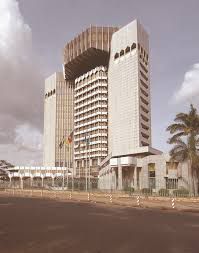
The employees of the BEAC had to display a broad smile by seeing the gratuities which will be paid to them on behalf of the financial year 2024 and which were decided by the Board of Directors. This completes an already very envied salary treatment. A decision which aims to reward the exponential growth of the institution’s net profit, but which questions in the light of the worrying economic and financial situation in CEMAC.
Meeting on March 26, 2025 in Malabo, the Equato-Guinean capital, the Board of Directors of the Bank of Central African States (BEAC), chaired by Yvan Bacale Ebe Molina, decided to gratify as it should be the employees of the BEAC after a record net profit of 355 billion FCFA carried out by the institution at the end of the 2024 exercise. To members of the Government of the BEAC and to the leaders of the General Secretariat of the Cobac, “said resolution No 9. Also, and exceptionally, the Council has decided to double the rate of additional gratuity paid to agents of the institution. To close everything, the administrators have multiplied by 5 their session allowances as well as those of the participants in the meetings of the Council.
22.26 billion FCFA of premiums
It is difficult to be able to precisely determine the encrypted amount of these gratuities which are added to an already enviable remuneration. Indeed, the wages of the members of the Government of the BEAC are located monthly in a range included in 15 and 25 million FCFA. Quarterly, each receives a “permeal premium” equivalent to a month and a half of their balance, which must be counted between 1.5 and 3 million CFA francs for each instance meeting. The rest of the staff is no less well treated. According to the data that she herself published, the BEAC counted in 2023, outside the 5 members of her government, 2,481 employees. The annual payroll of the institution was 66.5 billion FCFA to which were added 22.26 billion FCFA of various premiums (end -of -year bonuses, toy bonus, vacation bonuses, balance sheet premium) and gratifications. When we add social charges, personnel expenses absorbed 97.2 billion FCFA at the end of the year, representing more than half (54.5%) of the operating budget of the institution.
Princely treatment assumed
The princely treatment of BEAC agents had not left the ex-government indifferent, Abbas Mahamat Tolli. In his takeover speech in 2017, the manager had clearly indicated that he would tackle this situation declaring that “Beac cannot be an island of prosperity and opulence in a sub-region in crisis”. A battle that, according to internal sources, had sparked him enmities within the institution. His successor, Yvon Sana Bangui in the aftermath of his taking office, had to face an almost revolt of the members of his government which demanded an increase in their remuneration to bring it to the same level as that of the first leader of the institution. The project, presented on April 4, 2024 before the board of directors, also included an increase in advantages linked to their function, in particular an increase of 2.5 million to 6 million FCFAs of the housing bonus; A 30% increase in the furniture indemnity and a doubling of the number of function vehicles of each member from 2 to 4 with one with a monthly maintenance line of 600,000 FCFA.
The board of directors had finally rejected these proposals because they did not rely, according to the governor who was firmly opposed to it, on aImpact study to assess their long -term budgetary sustainability. For Sana Bangui, equalization of the wages of members of the government would have had an annual financial impact of more than 1.2 billion FCFA. This would not have failed to trigger a general discontent in a house where discretion is one of the key words that the Central African supports. However, does the choice to award colossal bonuses to the various stakeholders constitutes a response from the council to the discontent of members of the government?
Yet…
If the doubling or even the fivefold of the premiums granted by the BEAC board of directors arrest, it is mainly because they intervene at the time when CEMAC economies are going through a difficult period in particular with the COVVI 19 health crisis and the conflict between Russia and Ukraine. Inflation has broken records and should be below the target of 3% in 2025. Economic growth remains modest while the external reserves have experienced a considerable drop even if the current level remains comfortable.
In December 2024, in Yaoundé at an extraordinary summit, the CEMAC heads of state had alerted to the risks that an excessive degradation of the external reserves would have on the CEMAC economy. Added to this is the strong exposure of banks to sovereign risk (on loans and titles) which increased from 10% to the end of 2015 to 31% of the total assets at the end of 2023, threatening the stability of the regional financial system. So many challenges that challenge and on which experts believe that the regional central bank should more concentrate its energy. On the weakness of production and increased dependence on imports, for example, it is expected from the institution increased funding for sectors via the banking system.
(ℂ𝕦𝕝𝕝𝕖𝕕 𝕗𝕣𝕠𝕞 𝔼𝕄 𝕒𝕟𝕕 𝕥𝕣𝕒𝕟𝕤𝕝𝕒𝕥𝕖𝕕)


